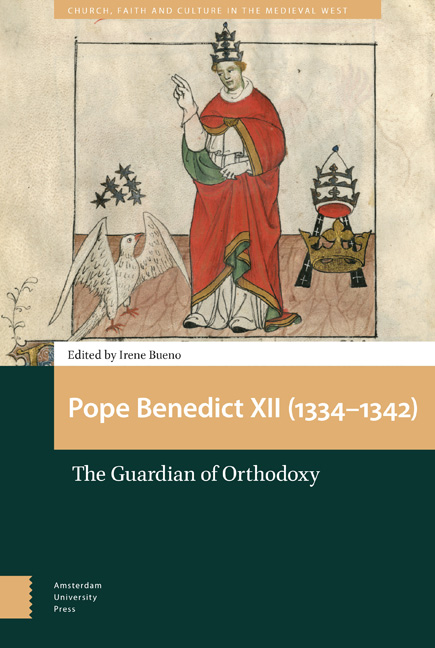Book contents
- Frontmatter
- Contents
- Abbreviations
- List of Illustrations
- Introduction: Benedict XII, the Guardian of Orthodoxy
- 1 Jacques Fournier and Thirteenth-Century Inquisitorial Methods
- 2 Recovering a Theological Advice by Jacques Fournier
- 3 Benedict XII and the Beatific Vision
- 4 A New Seat for the Papacy: Benedict XII, Avignon, and the Comtat Venaissin
- 5 In the Footsteps of St Peter: New Light on the Half-Length Images of Benedict XII by Paolo da Siena and Boniface VIII by Arnolfo di Cambio in Old St Peter’s
- 6 Benedict XII and Italy: Restoring Orthodoxy and Consolidating Papal Sovereignty after John XXII
- 7 Benedict XII and the Outbreak of the Hundred Years’ War
- 8 Benedict XII and the Crusades
- 9 Benedict XII and the Partes Orientis
- Index of Names
- Index of Subjects
1 - Jacques Fournier and Thirteenth-Century Inquisitorial Methods
Published online by Cambridge University Press: 11 December 2020
- Frontmatter
- Contents
- Abbreviations
- List of Illustrations
- Introduction: Benedict XII, the Guardian of Orthodoxy
- 1 Jacques Fournier and Thirteenth-Century Inquisitorial Methods
- 2 Recovering a Theological Advice by Jacques Fournier
- 3 Benedict XII and the Beatific Vision
- 4 A New Seat for the Papacy: Benedict XII, Avignon, and the Comtat Venaissin
- 5 In the Footsteps of St Peter: New Light on the Half-Length Images of Benedict XII by Paolo da Siena and Boniface VIII by Arnolfo di Cambio in Old St Peter’s
- 6 Benedict XII and Italy: Restoring Orthodoxy and Consolidating Papal Sovereignty after John XXII
- 7 Benedict XII and the Outbreak of the Hundred Years’ War
- 8 Benedict XII and the Crusades
- 9 Benedict XII and the Partes Orientis
- Index of Names
- Index of Subjects
Summary
Abstract
While serving as the bishop of Pamiers, Jacques Fournier oversaw an inquisition to uncover heresy in the bishopric. Breaking with thirteenth-century methods that produced brief accounts of material support of Cathar heretici, Fournier's inquiry contains lengthy depositions full of the minutiae of daily life. Scholars argue that Fournier was motivated by a keen interest or a desire to extend the power of the Church. Alternatively, this chapter proposes that his new approach reflected the changing nature of heresy in Languedoc. The depositions give ample evidence of heterodoxy but little proof of the types of interactions with heretici that were once common. The elimination of the heretici rendered the old formula useless, prompting a new method for inquiry.
Keywords: Jacques Fournier, thirteenth century, France, heresy, inquisition
Before Jacques Fournier was elected cardinal in 1327 or pope as Benedict XII in 1334, he distinguished himself in his role as bishop of Pamiers. As such, he established an inquisitorial office to uncover heresy in his bishopric in 1317. The diocese he oversaw was created by Pope Boniface VIII in 1295, largely in response to heterodoxy in the region; and, before Fournier became inquisitor, two investigations into heresy were conducted there. Indeed, in 1308, the inquisitor of Carcassonne, Geoffroy d’Ablis, arrested all the villagers of Montaillou save for the children, demonstrating the perceived level of infection in the region. The job of rooting out heretics in Pamiers had been the responsibility of the court at Carcassonne administered by the Dominicans, but when the Cistercian Fournier became bishop he took on the role of inquisitor by virtue of the twenty-sixth decree issued at the Council of Vienne, which in 1312 had decided that inquisitors were to work in concert with local bishops. Seeking to rid his diocese of error, Fournier worked at the new court at Pamiers alongside Dominicans Gaillard de Pomiès and Jean de Beaune from the court at Carcassonne. The difference between this inquisitorial court and those that came before it was not only the novelty of the bishop's involvement, however. Fournier's method of inquiry depended on eliciting responses from the accused through questioning, the expected format of inquisitorial examination; but the focus of his questions and the manner in which he engaged suspects produced lengthy depositions wherein the accused often related the minutiae of daily life as a part of their confession. Simply put, this was an innovation.
- Type
- Chapter
- Information
- Pope Benedict XII (1334–1342)The Guardian of Orthodoxy, pp. 27 - 56Publisher: Amsterdam University PressPrint publication year: 2018



